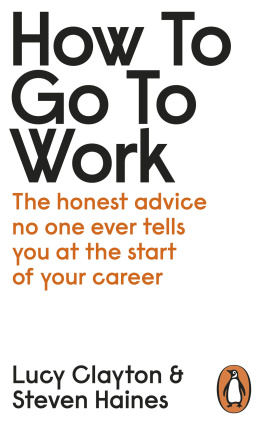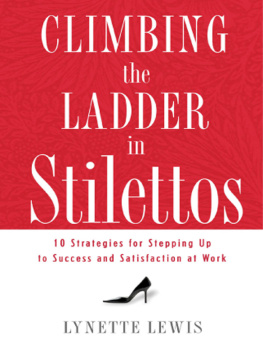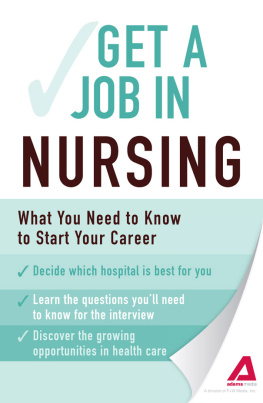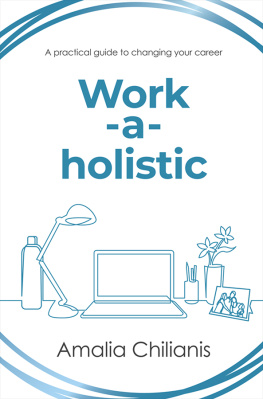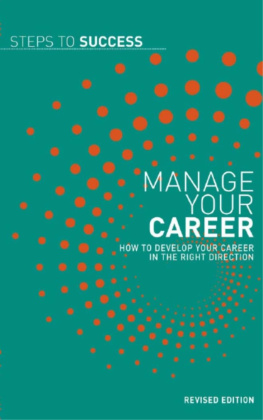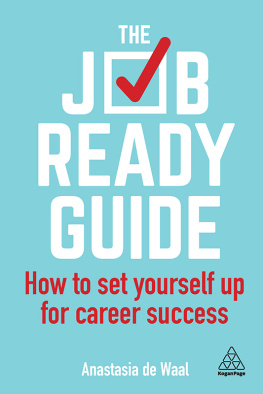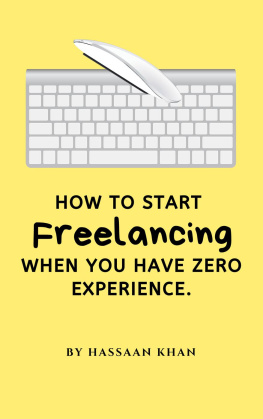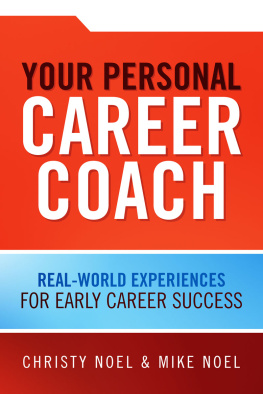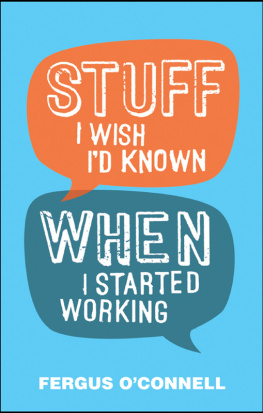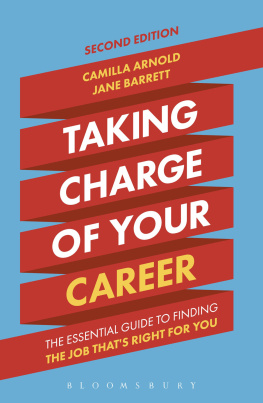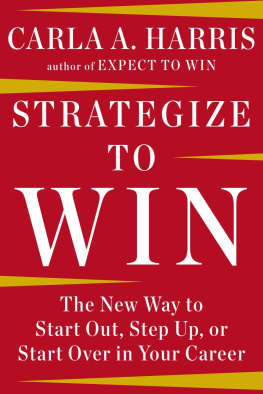PENGUIN BOOKS
How to Go to Work
The way work works is rapidly changing. This book is the resilience you need to adapt and thrive as you enter the workplace Paul Jarvis, author of Company of One
A vital book for anyone trying to get their head round the challenges of work An important but entertaining read Bruce Daisley, bestselling author of The Joy of Work
Solid, practical advice on everything from rsums to testing to working for a bad boss, interning, making an impression and building a network of allies that can sustain you throughout your career. Fresh, lively and invaluable. Plus its fun to read! Sally Helgesen, author of How Women Rise
Crucial insider information to help you quick-start a successful career Julia Laflin, author of Life Skills: Stuff You Should Really Know by Now
This book is essential for a generation of talent who arent equipped with what it means to start employment. Its delivered with sophistication and humour. A must-read Suki Sandhu, OBE, Founder and CEO of Audeliss and INvolve
This insightful and amusing tome will have you running to work, gleefully, in the correct trousers Patrick Grant, Norton & Sons (Savile Row), Community Clothing and The Great British Sewing Bee
Everything a young job-seeker needs in one place an essential resource Elizabeth Taylor, CEO of Employment Related Services Association
A refreshing take on career guidance Gugu Ndebele, Executive Director, Oprah Winfrey Leadership Academy for Girls
About the Authors
Lucy Clayton is passionate about discovering and mentoring talent. She is part of the charity Speakers 4 Schools, a committed network of leading figures who want to give back to young people in state schools. As former CEO of Community Clothing, a social enterprise with a mission to sustain and create jobs in the UK textile and garment making industry, she was honoured in the Financial Times and HERoes inaugural list of top 50 Champions of Women in Business 2017. She is the founder and presenter of DRESS: FANCY, a podcast series exploring the social significance of costume, and she is a speaker at industry events, including WGSN, Fashion Revolution, the Royal Academy and TED.
Steven Haines is a campaigner for social change. He began his career in UK Government, working on widening access to education for disabled children. He is now Executive Director for Policy and Campaigns at the National Deaf Childrens Society. He was the Global Campaign Mobilization Director at Save the Children International, supporting campaigners in 120 countries to reduce the rates of pregnant mothers and their babies dying in childbirth. He has worked as an adviser to the Government of Rwanda, where he helped put in place a programme to train the next generation of civil servants, and during 2015 was a Special Advisor in the United Nations Secretary Generals Office working on the Global Strategy for Womens, Childrens and Adolescents Health.
Lucy Clayton and Steven Haines
HOW TO GO TO WORK
The Honest Advice No One Ever Tells You at the Start of Your Career

PENGUIN BOOKS
UK | USA | Canada | Ireland | Australia
India | New Zealand | South Africa
Penguin Books is part of the Penguin Random House group of companies whose addresses can be found at global.penguinrandomhouse.com.

First published 2020
Copyright Lucy Clayton and Steven Haines, 2020
The moral right of the authors has been asserted
The list on by David Ogilvy is taken from The Unpublished David Ogilvy (Profile Books, 2012)
Text design by Couper Street Type Co.
Follow us on LinkedIn: linkedin.com/company/penguinbusiness
ISBN: 978-0-241-39947-7
This ebook is copyright material and must not be copied, reproduced, transferred, distributed, leased, licensed or publicly performed or used in any way except as specifically permitted in writing by the publishers, as allowed under the terms and conditions under which it was purchased or as strictly permitted by applicable copyright law. Any unauthorized distribution or use of this text may be a direct infringement of the authors and publishers rights and those responsible may be liable in law accordingly.
For Kit & Ella Get a job
Introduction
I grew up in a house where work was a dirty word. It meant something youd rather not be doing. It was just a distraction from the better business of living.
My parents were unambitious and unconnected, my dad didnt know anyone elses influential dad, my mum didnt aspire to earn a certain salary or to own a specific kind of car. For them, the concept of aspiration made very little sense because they already had everything they could possibly want: love, comedy, comfort and time to enjoy those things.
But they were grafters.
They knew that if you wanted to protect the stuff that mattered at home, you needed to put the hours in elsewhere. To fund fun time. One of my first life lessons was that if you want treats you have to work for them: those KFC family bucket feasts dont pay for themselves. I really love KFC.
But work is so much a part of how we all live that it doesnt make sense to think of it as just a distraction. Even if you are in the rare situation of working 9 to 5, five days a week, and getting eight hours sleep a night, youre spending well over a third of your waking hours at work. It takes up too much of your day-to-day to be an afterthought.
How we spend those hours has a fundamental impact on the quality of our lives. The UNs wonderfully titled World Happiness Report, which surveys thousands of people around the globe, shows that not only are people who are employed much happier than those who are not, but that managers, executives and officials feel much more satisfied with their lives than people in other roles. The balance between the variety of tasks, our opportunities to choose what we do and the support we get from our colleagues contributes greatly to our happiness.
Our social status and relationships are tied up in what we do for a living. Youve probably been asked Where do you want to be in ten years time? If youre anything like me, the weight of expectation in that question can make you feel pretty inadequate as you trawl through the sudden, alarming void of your mind to come up with something that sounds impressive. Or at least feasible. But remember, anyone whos able to answer that question with total clarity isnt allowing for the fact that our working lives, our adult lives, dont follow a perfect linear pathway from school to retirement. Career is a verb as well as a noun. And actually, its OK not to have a plan. As this book will demonstrate, many magnificent experiences can come from accidental careers, from unexpected opportunities. Who knows what might happen?
There are around 8 million young people in the UK between the ages of fifteen and twenty-four, and at some point in any given year, many of them will be going to work for the first time. In the US that number is 38 million. But our education systems are doing a terrible job of preparing young people for the realities of the working world. A British Chambers of Commerce survey of 3,000 firms found that nine out of ten thought school leavers were not ready for employment. So often the advice you will be given is based on flimsy or irrelevant examples, like sixth-form uniform policies which insist you wear business casual ignoring the fact that business casual hasnt been a dress code anywhere since nineteen eighty-something. School careers advisers are overstretched and under-resourced and at best they can only know a few industries superficially well.

